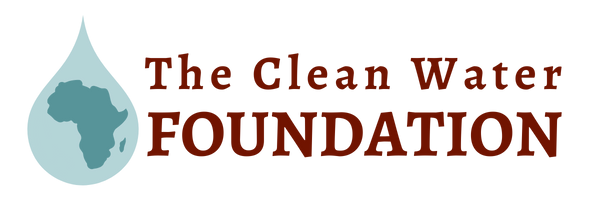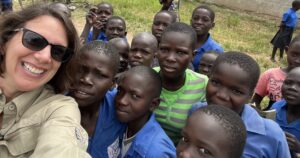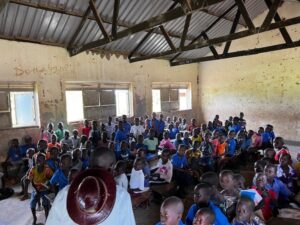Originally published here Wise Bread in 2012
- By Jason Steele
January 6, 2012 has become the most important day in the history of Pandinga village, a community of 1,000 people in western Uganda. On that day, hundreds of people from the village and its surrounding communities turned out to greet the first westerners ever to visit there. My father and I had journeyed two long days from the United States to Uganda, and one awful day by car to reach Pandinga. For hours, villagers presented speeches, sang and danced for us, and offered us gifts. Why were we treated with such honor? The answer is a story of the most precious commodity in the world, clean water.
Out of the blue, I received a call from my father who invited me to join him for an adventure in East Africa. We would visit Uganda, and trek into the tropical rainforests of the Virunga Mountains to see the endangered mountain gorillas, yet the trip had another purpose. We were going to help bring water to a village in western Uganda, and present bicycles to residents of Buhoma, a town in the remote mountains of southern Uganda that border Rwanda and the Democratic Republic of the Congo. As a father myself, who had just found out he was expecting his second child, I was reluctant to leave my home for two weeks to visit a part of the world I mostly knew from the horrific scenes in movies such as Hotel Rwanda, and The Last King of Scotland. But my wife and I both realized that a son rarely get to spend this kind of time with his father in one of the most beautiful places on earth. Once I assured her that we would be safe from genocide and mad dictators, she encouraged me to go.
At the Entebbe airport, my father is excited to see our driver, Owingi Milton and they hug like old friends. Three years ago, when my parents visited Buhoma to see the rare mountain gorillas, they met Milton (as he prefers to be called) while he was working at the lodge that they were staying in. My father, a retired attorney who is sometimes mistaken for a shorter version of Abraham Lincoln, had struck up a friendship with the gregarious 40 year old Milton and had kept in touch with him. Through Milton, he learned of the desperate need for clean water across Uganda and specifically in his home town of Pandinga. Upon returning to the United States, my father had created a non-profit foundation in order to raise money to drill a well, and bring clean water to his village. Previously, I had never known him to do anything more charitable than to make a small contribution to NPR.
Our first task is to drive around Kampala to meet with companies that drill wells in order to find out what it would take to bring water to Pandinga. By mid-day we are mired in traffic in the outskirts of Kampala, and by nightfall we find ourselves in a harrowing journey in an effort to reach our lodge near Murchison Falls along the Nile River. Milton drives at breakneck speeds over winding, pothole strewn dirt roads. Every time another vehicle passes, dust overwhelms us for a terrifying second. This entire trip is a mistake, and I spend hours pondering whether or not we would kill one of the children on the side of the road before rolling the SUV. I conclude that we were most likely die impacting a cow in the road. Forget the danger of dictators, genocide, gorillas, and guerrillas; zero visibility at 60 miles an hour is the best reason to stay home.
We awoke to realize that our lodge, really just a glorified tent camp, overlooked the Nile. We watch the great river float by while we wait for Milton to pick us up for the short drive to Pandinga, as he is running late. When we finally get underway, Milton reveals that we will be the first outsiders to visit Pandinga. When we question this claim, he describes how the villagers had been fortifying its access path from the road, in order to accommodate our vehicle. As we arrive, several hundred people surround our car. We are escorted to the base of a large tree where even more had gathered to greet us wearing their Sunday best. We later learn that hundreds more had shown up earlier, but were unable to remain when our arrival was delayed. The rumor was that Milton had not been truthful about our existence.
Stephen Ozelle, the leader of the village, is dressed in western clothes with a khaki safari vest. He welcomes us and leads the assembled masses in prayer to celebrate our arrival. My father is being referred to as “Tata” or Father of the village, and I am given the title of Brother. Next, a precession of women arrives in song bearing gifts. They drop down on their knees, bow their heads, and crawl towards us with offerings of grains, peanuts, and three live chickens. In return, we offer used shoes, racquetballs, reading glasses, and assorted school supplies. It feels like being part of a scene from a Hollywood movie. (Later, Milton offers to give the chickens a good home.)
The pageantry continues and we learn that among their many needs, clean water is paramount. To emphasize this point, we are shown a skit, complete with masks and costumes, dramatizing the social and medical consequences of 1,000 people attempting to subsist on water sources that are just muddy holes in the ground. These effects include infighting among the women who collect the water, families that are broken up over stresses caused a lack of clean water, and the ever present risk of sickness and death.
As much as I want to help these people, I am bewildered to be the star of this show. I haven’t even done anything for them other than survive the trip to their village. I don’t know much about drilling for water, but we did learn from the drilling experts in Kampala that we will need approximately $10,000 to have a well drilled several hundred feet into the water table. Attached to a hand pump, this well will serve approximately 500 villagers. We realize that two hand operated wells will be preferable to the unaffordable energy and maintenance requirements of a more productive design consisting of a diesel generator driving an electric pump.
The ceremony concludes with the playing of a xylophone constructed with eighteen logs of varying lengths laid over a pit in the earth several feet deep. A dozen men are required to play it using sticks covered in rubber from old tires. Next, we are escorted to a marshy area two miles away to witness how the village currently gathers its water. It is at least as bad as I imagined, as women kneel in the mud to retrieve one liter of brown water at a time to be emptied into yellow, 25 liter plastic jugs. Once filled, these 55 pound containers are hoisted onto their heads and transported back to the village. We later saw thousands of women doing on the side of the road, all across Uganda.
We are also taken to see two nearby wells. The first one is completely defunct, while the other is barely productive. Astonishingly, the cement surrounding the second well bears the name of the Ugandan Red Cross and a date of November of 2011, just two months earlier! It is unclear what kind of cruel malfeasance or miscalculation resulted in a well that is nearly useless ten weeks after it was constructed. At that time, we could only speculate if the Red Cross and its donors didn’t know or just didn’t care that it’s well went bust so quickly. Either way, we vow to ourselves to ensure that our miniscule resources will not go to waste.
At the end of the day, we find ourselves back at our tent hotel, again watching the Nile float by after having spent the day trying to solve the problem of clean water for a village of 1,000 people, not ten miles away. In the United States, our government would simply build a multi-million dollar water treatment plant, pump the water to the surrounding towns, and finance the project with a charge of $30 a month per household for virtually unlimited clean water. For much of Uganda, such a solution appears to be generations away, and I will never again look at the faucet in my house the same way.
But this is not a story about a primitive tribe being dazzled by strange outsiders. While the rest of the world may not be aware of Pandinga, their residents are aware of us. Although electricity is even scarcer than water, several villages had cell phones that they charged using portable solar panels. It even seemed like they had a better signal than I have in parts of Denver. We learned that they have at least one television and DVD player somewhere, when we were asked to send a copy of the video we took. Some, like Milton and Stephen Ozelle, left the village to work or earn a degree. Pandinga is not a place cut off from civilization, it is a subsistence farming village with few resources that is struggling to reach out to the world. Who are we to be the first to reach back? The next day, we see the Nile squeeze through a 40 foot crevice at Murcheson Falls. It was supposed to be spectacular.
Bicycles in Buhoma
We left Murcheson ahead of schedule to start our journey to Buhoma. Uganda is about the size of Oregon, yet it took us nearly three full days of driving on their hideous roads in order to get there.
In Buhoma, we met with Denis Rubalema, a native Ugandan with an unmistakably British accent. Denis is the director of Ride for a Woman, a bicycle shop in Buhoma with a mission to empower women in the villages surrounding the Bwindi Impenetrable Park. Working with his organization, we presented new bicycles to three women who previously had no access to transportation. With these bicycles, they would be able to reach the nearby towns to sell their farm goods, purchase supplies, and to receive medical care. For example, one of our recipients was Ms. Margaret Naranri, a divorced mother of nine children, four of whom currently remain at home. With a new bicycle, she and her children will now be able to bring their sugarcane to the market in the town of Butogota, nine miles away.
Our plan was to present bicycles to the women when we arrived in the morning, but as we were about to hand them over, I realized that they had arrived from the factory without any of the necessary tuning or adjustment. While I watched a local bicycle repairman struggle to prepare them for delivery, I felt frustrated, but relieved. As a former bicycle mechanic, I put down my camera, picked up a wrench, and finally did some tangible good with my own hands. Only the next day did we finally get around to being tourists. On a guided hike into the nearby mountains, we encountered an enormous silverback in the process of mating. He didn’t seem to be bothered by our presence any more than he did by the fourteen other gorillas surrounding us. Just a day later, we boarded the first of several international flights that would take home.
A couple nights later I am at a busy intersection in Denver, watching it snow while waiting for a traffic light to change. I remember asking my wife, “Where are we?” I had left to see the other side of our planet, but found another world. On previous vacations my parents just returned home with snapshots and souvenirs, but they came back from Uganda with a mission to start a foundation. When you befriend a man like Milton and visit a place like Pandinga, you never really return.
Postscript
Working from his office in the United States, my father learned that the company that drilled the wells in Pandinga was one of the drillers we met with in Kampala. Through my father’s persistence, he got the company to repair the well that was barely functioning, but learned that the second well would never work. He is currently in the process of contracting for a new well to be drilled in Pandinga. I also found some better bicycles for Buhoma. I assume Milton and his family ate the chickens.


